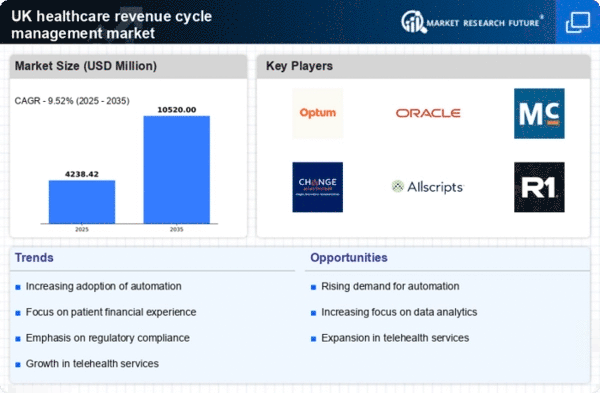Shift Towards Value-Based Care Models
The transition from volume-based to value-based care models is reshaping the healthcare revenue-cycle-management market in the UK. This shift emphasizes the quality of care provided rather than the quantity of services rendered, prompting healthcare organizations to reevaluate their revenue cycle strategies. Value-based care models incentivize providers to deliver high-quality services, which can lead to improved patient outcomes and satisfaction. As a result, healthcare organizations are investing in analytics and performance measurement tools to track the effectiveness of their care delivery. This trend is expected to drive a 10% increase in revenue for organizations that successfully implement value-based care initiatives. The healthcare revenue-cycle-management market must adapt to these evolving models to ensure sustainable financial performance.
Increasing Demand for Cost Transparency
In the UK, there is a growing demand for cost transparency in healthcare services, which significantly impacts the healthcare revenue-cycle-management market. Patients are increasingly seeking clarity regarding the costs associated with their treatments, prompting healthcare providers to adopt more transparent billing practices. This shift is driven by consumer expectations and regulatory pressures aimed at enhancing patient engagement. As a result, healthcare organizations are investing in tools that provide clear cost estimates and detailed billing information. This trend not only improves patient satisfaction but also reduces the likelihood of billing disputes, thereby streamlining the revenue cycle. It is estimated that organizations that prioritize cost transparency may see a 15% improvement in patient retention rates, further solidifying their position in the competitive healthcare landscape.
Rising Operational Costs and Efficiency Needs
The healthcare revenue-cycle-management market is under pressure from rising operational costs, compelling organizations to seek greater efficiency in their revenue cycle processes. In the UK, healthcare providers face increasing expenses related to staffing, technology, and compliance, which can erode profit margins. To counteract these challenges, many organizations are turning to process optimization and workforce management solutions. By streamlining operations and reducing administrative burdens, healthcare providers can enhance their financial performance. It is estimated that organizations that implement efficiency measures can achieve cost savings of up to 25%, thereby improving their overall revenue cycle outcomes. This focus on operational efficiency is likely to remain a key driver in the healthcare revenue-cycle-management market.
Technological Advancements in Billing Systems
The healthcare revenue-cycle-management market is experiencing a notable shift due to advancements in billing technologies. The integration of sophisticated software solutions enhances the efficiency of billing processes, reducing errors and accelerating payment cycles. In the UK, the adoption of electronic health records (EHR) and automated billing systems has been linked to a 20% increase in revenue collection rates. These technologies streamline the claims process, allowing healthcare providers to focus on patient care rather than administrative tasks. Furthermore, the implementation of cloud-based solutions offers scalability and flexibility, enabling healthcare organizations to adapt to changing regulatory requirements. As these technologies continue to evolve, they are likely to play a pivotal role in shaping the future of the healthcare revenue-cycle-management market.
Regulatory Changes and Compliance Requirements
The healthcare revenue-cycle-management market is significantly influenced by ongoing regulatory changes in the UK. Compliance with new regulations, such as those related to data protection and billing practices, necessitates continuous adaptation by healthcare organizations. The introduction of the General Data Protection Regulation (GDPR) has heightened the focus on data security and patient privacy, compelling providers to invest in compliance training and technology. Non-compliance can result in substantial fines, which may reach up to £17.5 million or 4% of annual global turnover, whichever is higher. Consequently, healthcare organizations are increasingly prioritizing compliance as a core component of their revenue cycle strategies. This focus on regulatory adherence not only mitigates financial risks but also enhances the overall integrity of the healthcare revenue-cycle-management market.




















Leave a Comment